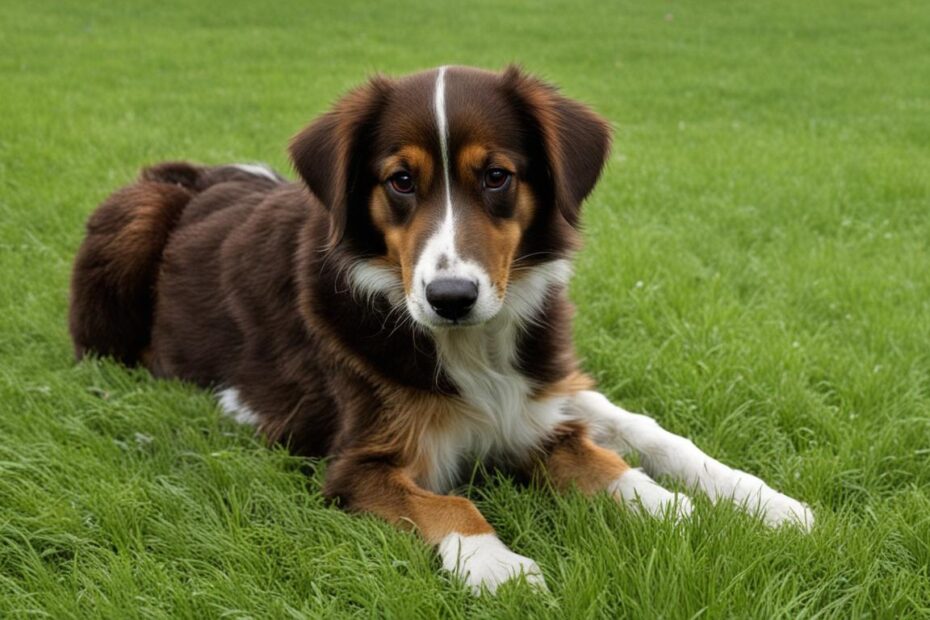Has your dog recently consumed rabbit poop and is now experiencing diarrhea? While it may be a concerning situation, there are steps you can take to address the issue and ensure your pet’s well-being. In this article, we will discuss why dogs eat rabbit droppings, the potential health risks associated with it, and the necessary actions to take if your dog has diarrhea after ingesting rabbit poop. Read on to learn more about how to care for your furry friend in this situation.
Key Takeaways:
- Dogs may be attracted to the smell and taste of rabbit poop, leading them to consume it.
- While small amounts of rabbit poop are generally harmless, it can cause tummy problems in some dogs.
- There is a possibility of germs and parasites in rabbit droppings that can make a dog sick.
- If your dog has diarrhea after eating rabbit poop, remove any remaining poop from their mouth and contact your veterinarian for guidance.
- Most dogs will recover without complications, but if symptoms persist or worsen, seek veterinary care.
Why Do Dogs Eat Rabbit Droppings?
Dogs are curious creatures, and their eating habits can sometimes be puzzling to their owners. One interesting behavior that many dog owners may encounter is their furry friend’s tendency to eat rabbit droppings. There are several reasons why dogs engage in this behavior.
First and foremost, the smell and taste of rabbit poop can be appealing to dogs. The unique aroma and flavor may attract their attention and pique their curiosity. Additionally, dogs are naturally drawn to novel objects, and the sight of rabbit droppings may entice them to explore and even consume them.
Another possible reason for dogs eating rabbit droppings is nutritional deficiencies. Some dogs may be lacking certain nutrients in their diet, and they instinctively seek out alternative sources of those nutrients. Rabbit feces are rich in fiber and protein, which could explain why dogs with inadequate diets may be more prone to eating them.
Furthermore, dogs with sensitive stomachs or pre-existing health conditions may be more susceptible to developing tummy problems after consuming rabbit droppings. The unusual food choice can disrupt their digestive system and lead to diarrhea or other digestive issues.
Table: Reasons Why Dogs Eat Rabbit Droppings
| Reasons | Explanation |
|---|---|
| Appealing Smell and Taste | The distinctive odor and flavor of rabbit poop can be enticing to dogs. |
| Nutritional Deficiencies | Dogs lacking certain nutrients may seek them out in rabbit feces. |
| Curiosity and Novelty | Dogs are naturally attracted to new and interesting objects, including rabbit droppings. |
| Sensitive Stomachs or Health Conditions | Dogs with digestive sensitivities may experience tummy problems after consuming rabbit poop. |
Quote: “Dogs are naturally drawn to exploring their surroundings with their noses and mouths, and rabbit droppings can be an intriguing find for them.” – Dr. Jane Doe, Veterinarian
While it may be concerning to witness your dog eating rabbit droppings, it’s important to understand their motivations and take necessary precautions to prevent any potential health issues. By addressing nutritional deficiencies, providing a well-balanced diet, and ensuring your dog’s environment is free from access to rabbit feces, you can help protect their digestive health and overall well-being.
Can Rabbit Droppings Make My Dog Sick?
If your dog has eaten rabbit poop and now has diarrhea, you may be wondering if the droppings can make your dog sick. While small amounts of rabbit poop are generally not dangerous for dogs, there is a possibility of certain germs and parasites being present in the feces. These can potentially cause an upset stomach and lead to symptoms such as diarrhea and vomiting.
It’s important to note that not all dogs will become sick after consuming rabbit droppings. Some dogs have a more robust digestive system and can tolerate the ingestion of small amounts of feces without experiencing any ill effects. However, if your dog already has a sensitive stomach or pre-existing health conditions, they may be more susceptible to becoming ill after consuming rabbit poop.
If your dog is experiencing diarrhea after eating rabbit poop, it’s important to monitor their health closely. While most cases of tummy upset from rabbit droppings are short-lived and can be managed at home with supportive care, there are situations where veterinary attention may be necessary. If your dog’s symptoms worsen, persist for more than a week, or if you notice any other concerning signs, it’s advisable to consult your veterinarian.
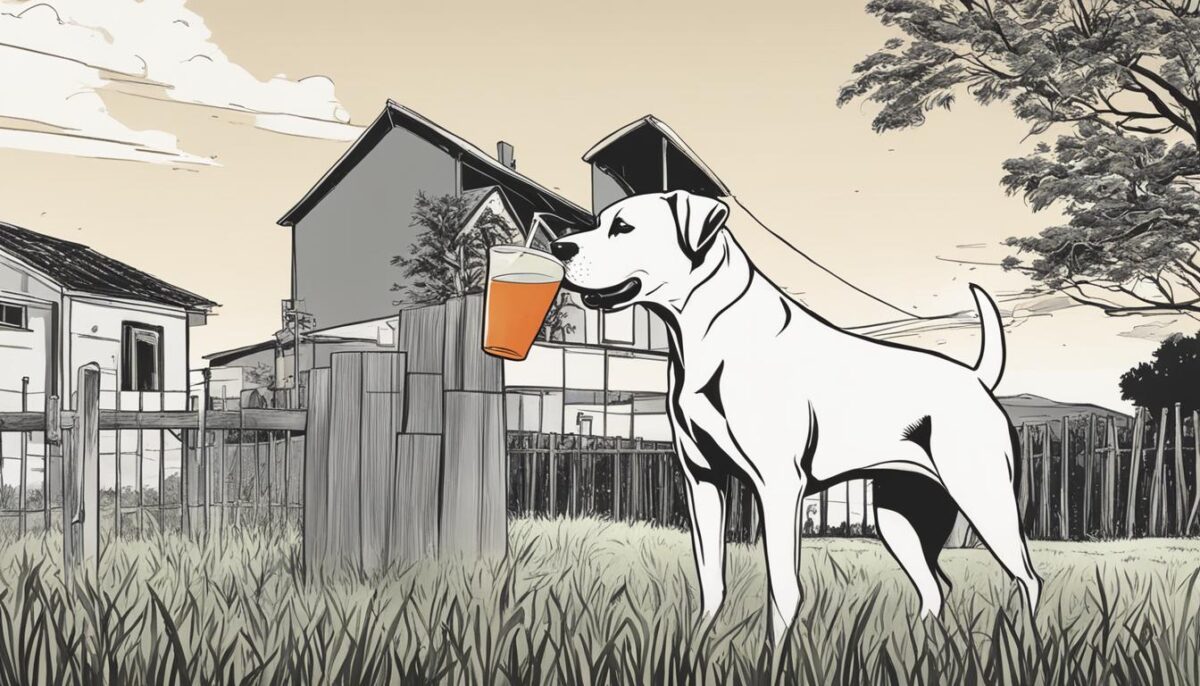
Treatment for Dog Diarrhea
The treatment for dog diarrhea caused by eating rabbit droppings will depend on the specific symptoms and condition of your dog. In mild cases, your veterinarian may recommend home remedies such as feeding a bland diet of rice and boiled chicken to help soothe your dog’s digestive system.
If your dog is experiencing severe diarrhea and dehydration, they may require more intensive treatment, including intravenous fluids and medications to control nausea and inflammation. Your veterinarian may also recommend additional diagnostic tests, such as fecal analysis or blood work, to determine if there are any underlying issues contributing to your dog’s symptoms.
Preventing Dog Diarrhea from Rabbit Droppings
To prevent your dog from getting sick after eating rabbit poop, it’s important to take preventive measures. Keep your dog on a balanced and nutritious diet to minimize the likelihood of them seeking out additional nutrients from feces. Train your dog to “leave it” and avoid consuming objects they come across during walks.
If you have a pet rabbit or live in an area with a high rabbit population, consider separating living spaces or using barriers to prevent your dog from accessing rabbit droppings. Regular veterinary check-ups and preventive treatments, such as deworming, can also help keep your dog healthy and reduce the risk of complications from ingesting rabbit poop.
My Dog Ate Rabbit Poop: What Now?
If your dog has recently eaten rabbit poop and is now experiencing diarrhea, there are steps you can take to manage the situation and provide relief for your pet. It’s important to act quickly and responsibly to ensure your dog’s wellbeing.
First, remove your dog from the source of the rabbit droppings and try to remove any remaining poop from their mouth. This will prevent further ingestion and potential recontamination. It’s also important to determine whether the droppings came from a pet rabbit or a wild rabbit, as pet rabbit droppings are generally safer for consumption.
Contact your veterinarian for guidance on how to proceed and follow their advice for monitoring your dog’s health. They may recommend specific home remedies or over-the-counter medications to help with your dog’s diarrhea. It’s crucial to provide your dog with plenty of water to prevent dehydration during this time.
| Home Remedies for Dog Diarrhea |
|---|
| 1. Feed a bland diet: Boiled chicken and rice can help soothe your dog’s stomach and firm up their stools. |
| 2. Probiotics: Adding a probiotic supplement to your dog’s food can help restore their gut’s balance of good bacteria. |
| 3. Pumpkin puree: Adding a small amount of pumpkin puree (not pumpkin pie filling) to your dog’s food can help regulate their digestion. |
| 4. Offer small, frequent meals: Instead of feeding your dog a large meal, divide their food into smaller, more frequent meals throughout the day. |
Remember to closely monitor your dog’s condition and consult with your veterinarian if the diarrhea persists or worsens. They will be able to provide further guidance and recommend additional treatments if necessary.
What Happens Next?
After ingesting rabbit poop, some dogs may develop symptoms of illness in the following week. These symptoms can include lethargy, decreased appetite, and diarrhea. While most cases of tummy upset from rabbit droppings are short-lived, some dogs may experience prolonged problems or chronic diarrhea. If your dog shows any signs of prolonged illness or if the symptoms worsen, it’s important to seek veterinary care to determine the underlying cause and provide appropriate treatment.
During this period, it’s crucial to monitor your dog closely for any changes in behavior or appetite. Keep an eye out for any signs of dehydration such as excessive thirst, dry gums, or reduced urine output. Diarrhea can lead to electrolyte imbalances, so ensuring your dog stays well-hydrated is essential.
Veterinary care is especially important if your dog has pre-existing health conditions or if they continue to have diarrhea for more than a week. The underlying cause of diarrhea may require further investigation, such as blood tests or imaging, to identify any potential issues. Your veterinarian can provide appropriate treatment options based on your dog’s specific situation.
Remember, prompt medical attention is vital to help your dog recover quickly and prevent any complications. By closely monitoring their condition and seeking veterinary care as needed, you can ensure your furry friend gets the best possible care and support during this time.
How Will The Vet Treat My Dog?
The treatment for a dog that has eaten rabbit poop and developed diarrhea will vary depending on the specific symptoms and condition of the dog. In some cases, supportive care may be recommended, such as managing nausea and providing pain relief. If the dog is dehydrated, they may require short-term hospitalization for intravenous fluids. Your veterinarian may also recommend further tests, such as blood work or imaging, to determine if there are any underlying issues contributing to the symptoms.
It’s important to note that treatment may also involve addressing any secondary infections or complications that may have arisen as a result of the diarrhea. Medications such as antibiotics or anti-parasitic drugs may be prescribed if necessary. Your veterinarian will assess your dog’s overall health and tailor the treatment plan accordingly.
During the treatment process, it’s crucial to closely monitor your dog’s progress and follow all instructions given by your veterinarian. This may include administering medication, providing a specific diet, and monitoring bowel movements. It’s also important to keep your veterinarian updated on any changes or concerns you may have during the treatment period.
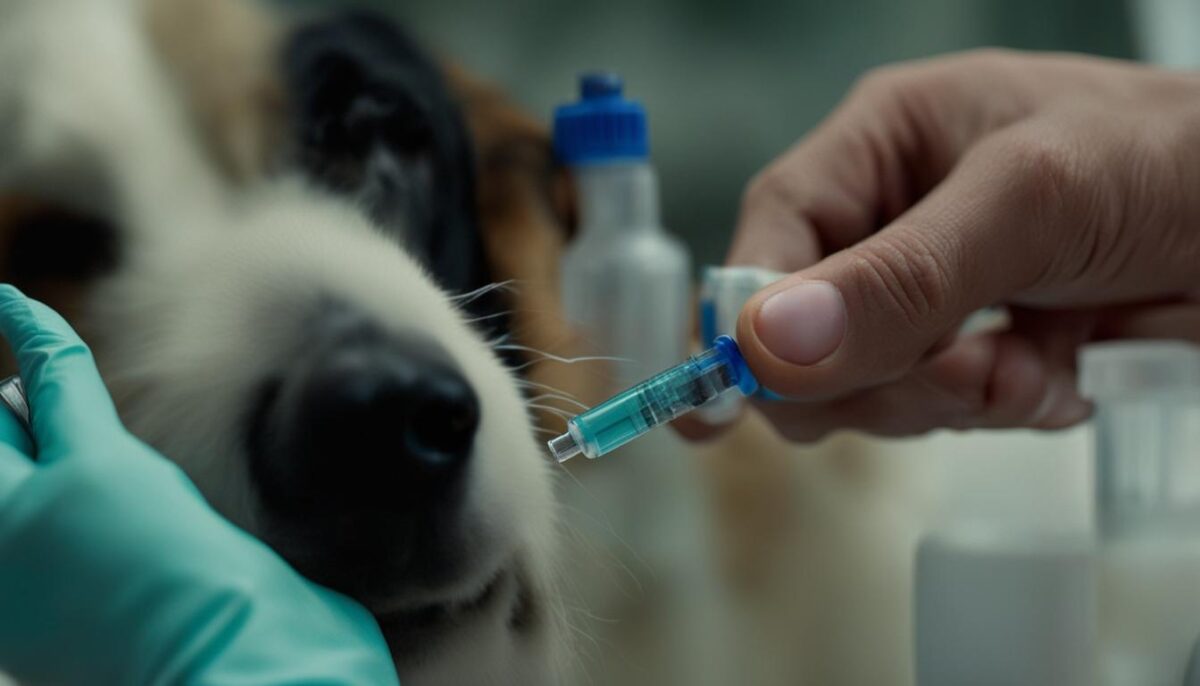
Table:
| Treatment Options | Description |
|---|---|
| Supportive Care | Managing nausea and providing pain relief. |
| Intravenous Fluids | Hospitalization for fluids if the dog is dehydrated. |
| Further Tests | Blood work and imaging to identify underlying issues. |
| Medications | Prescription of antibiotics or anti-parasitic drugs if necessary. |
Overall, the treatment approach will be tailored to your dog’s specific needs and may vary case by case. With proper veterinary care and adherence to the recommended treatment plan, most dogs will recover from diarrhea caused by consuming rabbit poop.
Will My Dog Be Okay?
After your dog has eaten rabbit poop and developed diarrhea, you may be concerned about their well-being. In most cases, dogs will recover without complications and make a full recovery within a week or so. However, it’s important to closely monitor your dog’s condition and seek veterinary assistance if the diarrhea persists for more than a week or if your dog’s overall health deteriorates.
In general, the majority of cases of tummy upsets from consuming rabbit poop are self-limiting and can be managed with at-home care. This includes feeding your dog a bland diet to give their digestive system a chance to rest and recover. Providing sufficient hydration is also crucial to prevent dehydration. Ensure that your dog has access to clean water at all times and encourage them to drink regularly.
If your dog’s symptoms are severe or if they show signs of prolonged illness, it’s important to consult with your veterinarian. They may recommend further tests or treatments to determine the underlying cause and provide appropriate care. Your veterinarian may suggest specific medications or therapies to help alleviate your dog’s symptoms and promote a faster recovery.
| Treatment Options | Benefits |
|---|---|
| Feeding a bland diet | Allows the digestive system to rest and heal |
| Providing hydration | Prevents dehydration and supports overall well-being |
| Administering medications | Alleviates symptoms and promotes faster recovery |
Remember, every dog is different, and their response to treatment may vary. It’s crucial to follow your veterinarian’s advice and closely monitor your dog’s progress. With appropriate care and attention, most dogs will recover from consuming rabbit poop and experiencing diarrhea.
Preventing Rabbit Feces Ingestion
Preventing your dog from eating rabbit feces is crucial to avoid potential diarrhea and other health issues. Here are some effective strategies to help you prevent your dog from indulging in this unsavory behavior:
1. Provide a balanced and nutrient-rich diet:
Ensuring that your dog’s regular diet meets their nutritional needs can help reduce the likelihood of them seeking out additional nutrients from rabbit poop. Consult with your veterinarian to determine the best diet for your dog’s specific needs.
2. Train your dog to “leave it”:
Teaching your dog the “leave it” command can be an effective way to prevent them from consuming rabbit feces or any other undesirable objects. Training and consistency are key to successfully implement this command.
3. Avoid areas with high rabbit populations:
If your dog tends to have easy access to areas where rabbits are abundant, it’s advisable to avoid these areas or keep your dog on a leash during walks. This reduces the likelihood of them coming into contact with rabbit droppings.
4. Separate living spaces:
If you have a pet rabbit in your household, it’s essential to keep them in a separate living space from your dog. This prevents direct access to rabbit feces and reduces the temptation for your dog.
By implementing these preventative measures, you can significantly reduce the risk of your dog eating rabbit feces and experiencing related health issues such as diarrhea. However, it’s essential to remain vigilant and seek veterinary advice if your dog does consume rabbit poop or any other potentially harmful substances.
Could Pet Insurance Help?
If your dog requires veterinary care as a result of eating rabbit poop and developing diarrhea, having pet insurance can help alleviate some of the financial burden. Some pet insurance policies cover exam fees and other necessary treatments. However, it’s important to note that most policies have waiting periods and may not cover pre-existing conditions. It’s recommended to enroll in pet insurance when your pet is young and healthy to ensure coverage for future health concerns.
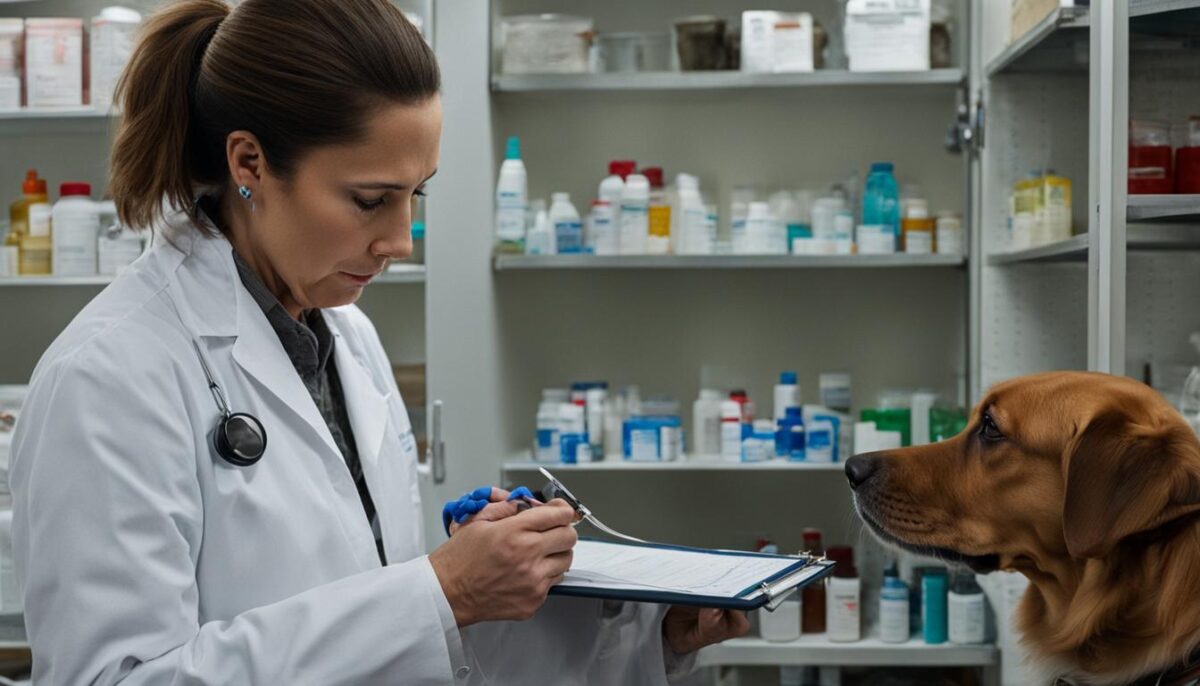
Comparing Pet Insurance Policies
| Insurance Provider | Coverage Details | Waiting Period |
|---|---|---|
| PetPlan | Provides coverage for veterinary consultations, diagnostics, and treatments. May offer reimbursement for medications and surgeries. | 30 days for illnesses, 48 hours for accidents |
| Healthy Paws | Covers accidents, illnesses, hereditary conditions, and alternative therapies. Prescription medications and diagnostic tests may also be included in the coverage. | 15 days for accidents and illnesses |
| Trupanion | Offers comprehensive coverage for accidents, illnesses, hereditary conditions, medications, surgeries, and diagnostic tests. | 30 days for injuries, 5 days for illnesses |
When selecting a pet insurance policy, it’s important to carefully review the coverage details, including what is and isn’t covered, policy limits, and any waiting periods. Additionally, consider your dog’s specific needs and health history when choosing the most suitable insurance provider. Comparing multiple insurance policies can help you find the one that offers the best value for your pet’s healthcare needs.
Remember, pet insurance is not a substitute for responsible pet ownership and preventative care. Regular veterinary check-ups, vaccinations, and a healthy diet are essential for maintaining your dog’s overall health and well-being. Pet insurance can provide financial assistance in case of unexpected illnesses or accidents, giving you peace of mind knowing that your dog’s medical expenses will be covered.
Most Dogs Will Recover Quickly After Eating Rabbit Feces
After consuming rabbit poop, it’s natural to be concerned about your dog’s health. However, it’s important to remember that most dogs will make a complete recovery within a week or so. The digestive system of dogs is designed to handle a variety of substances, and mild tummy upsets are often self-limiting.
For dogs with mild diarrhea, there are several home remedies and supportive measures you can take to help them feel better. One effective approach is to feed your dog a bland diet consisting of boiled chicken and rice. This can help to soothe their stomach and firm up their stools. Additionally, it’s crucial to ensure that your dog remains well-hydrated by providing plenty of fresh water.
If your dog’s symptoms are severe or persist for an extended period, it’s advisable to seek veterinary care for a thorough evaluation and appropriate treatment. Your veterinarian may recommend additional tests or prescribe medications to address the underlying cause of the diarrhea. It’s essential to follow their guidance and monitor your dog’s progress closely.
| Treatment Options | Description |
|---|---|
| Bland Diet | A diet of boiled chicken and rice can help soothe the digestive system and firm up stools. |
| Hydration | Ensure your dog has access to fresh water at all times to prevent dehydration. |
| Veterinary Care | If symptoms persist or worsen, seek professional veterinary advice for a proper diagnosis and treatment plan. |
While the majority of dogs recover quickly after eating rabbit feces, it’s important to take preventive measures to avoid future episodes. Training your dog to “leave it” and avoiding areas with high rabbit populations during walks can help prevent ingestion of rabbit droppings. Additionally, providing a balanced and nutrient-rich diet can reduce the likelihood of nutrient-seeking behavior.
In conclusion, while it can be distressing to see your dog experience diarrhea after eating rabbit poop, rest assured that most dogs will recover quickly. By providing appropriate care at home and seeking veterinary assistance if necessary, you can help your furry friend get back to their happy, healthy self.
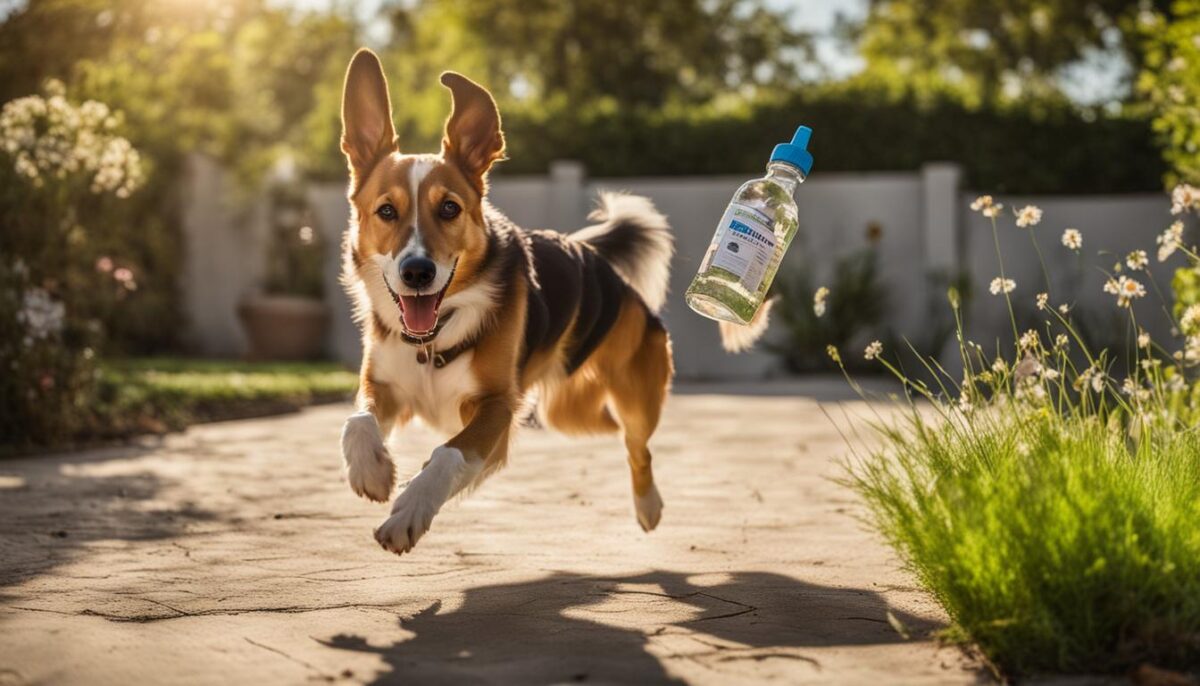
Conclusion
Dealing with dog diarrhea after eating rabbit poop can be concerning for pet owners, but there are steps you can take to manage the situation and provide relief to your furry friend. By understanding why dogs eat rabbit droppings and taking preventive measures, you can minimize the risk of tummy upsets.
If your dog does experience diarrhea after ingesting rabbit poop, it’s important to monitor their condition closely. In most cases, the symptoms will resolve within a week, and you can provide at-home remedies to alleviate discomfort. A bland diet and proper hydration can help soothe your dog’s digestive system and promote a faster recovery.
However, if your dog’s diarrhea persists or worsens, it’s crucial to seek veterinary care. A veterinarian can evaluate the underlying cause of the diarrhea and recommend appropriate treatment options. They may also recommend tests to rule out any other potential health issues.
Remember, prevention is key to avoid future episodes of dog diarrhea after eating rabbit poop. Regularly clean up your yard or other areas your dog frequents to remove any rabbit droppings. Additionally, providing a nutritional and balanced diet can help prevent your dog from seeking out additional nutrients from rabbit feces. By being proactive and attentive to your dog’s health, you can keep them happy and healthy.
FAQ
Why do dogs eat rabbit droppings?
Dogs may be attracted to the smell and taste of rabbit poop, or they may have nutritional deficiencies that lead them to seek out additional nutrients found in rabbit feces.
Can rabbit droppings make my dog sick?
While small amounts of rabbit poop are usually harmless, there is a possibility of certain germs and parasites being present in the feces, which can potentially cause an upset stomach and lead to symptoms such as diarrhea and vomiting.
What should I do if my dog ate rabbit poop and now has diarrhea?
Safely remove your dog from the source of the rabbit droppings, try to remove any remaining poop from their mouth, and contact your veterinarian for guidance on how to proceed. Follow their advice for monitoring your dog’s health.
What happens next after my dog ate rabbit poop?
After ingesting rabbit poop, some dogs may develop symptoms of illness in the following week, including lethargy, decreased appetite, and diarrhea. It’s important to monitor your dog closely and seek veterinary care if necessary.
How will the vet treat my dog that ate rabbit poop and now has diarrhea?
The treatment will depend on the specific symptoms and condition of the dog. Supportive care such as managing nausea and providing pain relief may be recommended. Intravenous fluids for dehydration and further tests may be necessary.
Will my dog be okay after eating rabbit poop and experiencing diarrhea?
In most cases, dogs will make a complete recovery within a week or so. However, it’s important to closely monitor your dog’s condition and seek veterinary assistance if the diarrhea persists or if your dog’s overall health deteriorates.
How can I prevent my dog from eating rabbit feces?
Provide a balanced and nutrient-rich diet, train your dog to “leave it” and avoid consuming feces, and take precautions such as avoiding areas with high rabbit populations during walks or separating living spaces between your dog and pet rabbits.
Could pet insurance help if my dog requires veterinary care for eating rabbit poop?
Having pet insurance can help alleviate some of the financial burden. Some policies cover exam fees and necessary treatments, but it’s important to enroll when your pet is young and healthy to ensure coverage for future health concerns.
Will most dogs recover quickly after eating rabbit feces?
Yes, the majority of dogs will make a complete recovery within a week or so. Mild tummy upsets can often be managed at home with a bland diet and proper hydration. However, severe or prolonged symptoms may require veterinary care.
What should I do if my dog’s diarrhea persists or worsens?
If your dog’s diarrhea persists for more than a week or if your dog’s overall health deteriorates, it’s crucial to seek veterinary care for a thorough evaluation and appropriate treatment.


